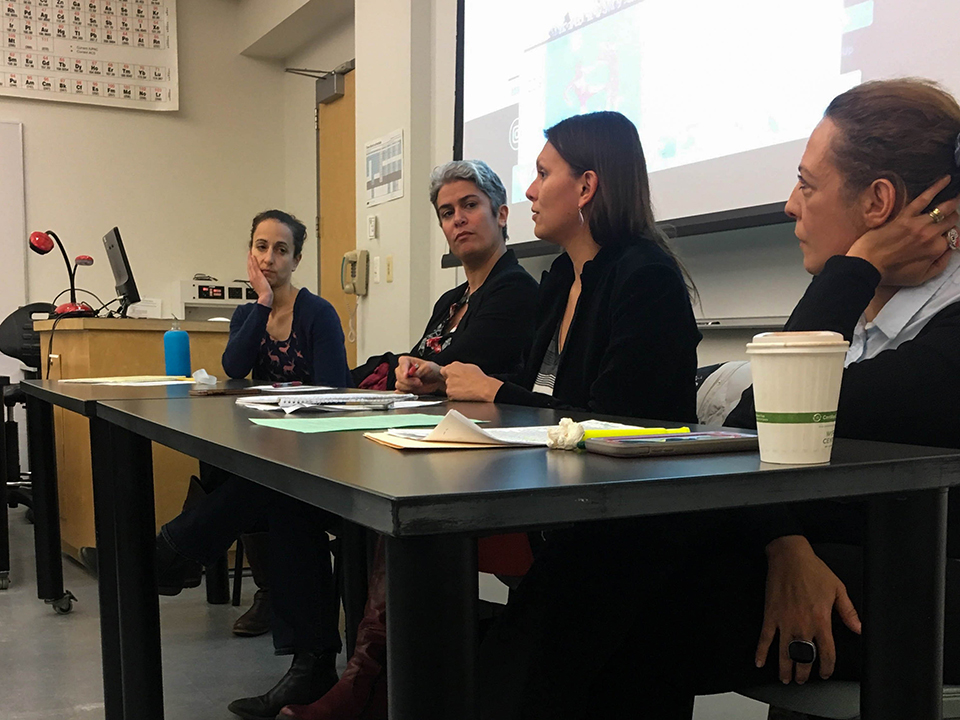Panel illuminates 2019 uprisings in the Middle East
November 14, 2019
 Brianna Cunliffe
Brianna CunliffeOn Monday, Visiting Assistant Professor of History Idriss Jebari moderated “Late Springs: Arab Uprisings in 2019,” a panel that featured faculty members speaking on uprisings in Algeria, Iraq, Lebanon and Egypt. The event drew a crowd of students interested in the Middle East to Kanbar Hall to hear stories that, according to Jebari, are largely absent from or misrepresented by media coverage.
Assistant Professor of Romance Languages and Literatures Meryem Belkaid, an Algerian who took her sabbatical in the Middle East during the beginning of these uprisings, spoke on the past nine months’ peaceful unrest which has become known, she said, as the “revolution of smiles.”
Assistant Professor of Government Barbara Elias, who specializes in counterinsurgency, spoke on Iraq. Since early October, Iraq has been in the midst of its largest uprising since 2003, sparked primarily by unrest surrounding foreign interference by Iran and Saudi Arabia and economic injustices.
Pamela Klasova, Andrew W. Mellon Postdoctoral Fellow in Arabic, said she recalled seeing no hint of the upcoming revolution when she lived in Lebanon over the summer. Protests, prompted by a new tax imposed on the messaging service WhatsApp, have broadened to reject Lebanon’s sectarian government and incomplete democracy.
Batool Khattab, lecturer in Arabic and a native Egyptian who often returns to visit family, spoke on uprisings from 2013 to the present short-lived protests under President of Egypt Abdel Fattah el-Sisi. She said that, despite the counter-insurgency rhetoric and the repressive regime, “young people have the courage to take to the streets.”
Klasova and Khattab clarified that they spoke not only as political scientists, but also from experience. Jebari emphasized that the panel was designed to highlight personal connections in addition to academic knowledge.
“Our opportunity was to give [these uprisings] this more lived dimension,” he said.
Given that the spark and spread of each uprising have been greatly aided by the internet, multiple panelists emphasized that this is a social media revolution. However, beyond the role of modern technology, Elias observes commonalities in the uprisings.
“There’s a rejection from the bottom up of these systems that have been broken for a long time,” Elias said. “[There’s] this idea that we could be what we want to be—a new Egypt, a new kind of Iraq, a new kind of Lebanon.”
After each panelist laid out the situation in their country of expertise, Jebari opened the discussion to student questions, which covered topics ranging from the role of the diaspora to the risks associated with the future.
“In the Middle East, it’s uncertain, but it’s also electric,” Elias said. “There are notions of chaos and destruction and war, but there is also this endemic hope within the Arab world at the moment.”
Jebari wanted to bring the panel to a close with a reflection of that hope. Panelists obliged, sharing humorous signs, slogans and memories of festival-like protests, where sentiments of change are in the air.

Comments
Before submitting a comment, please review our comment policy. Some key points from the policy: